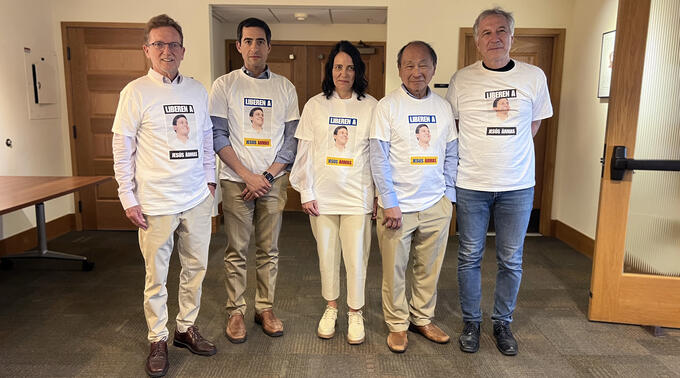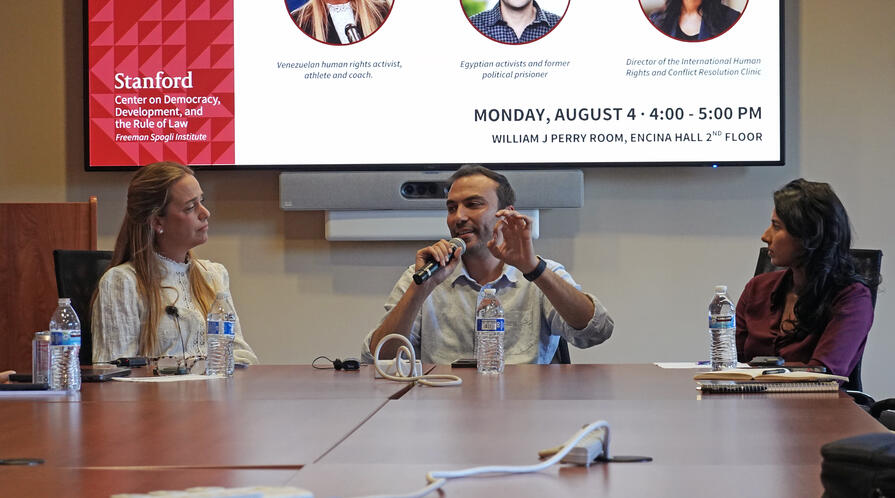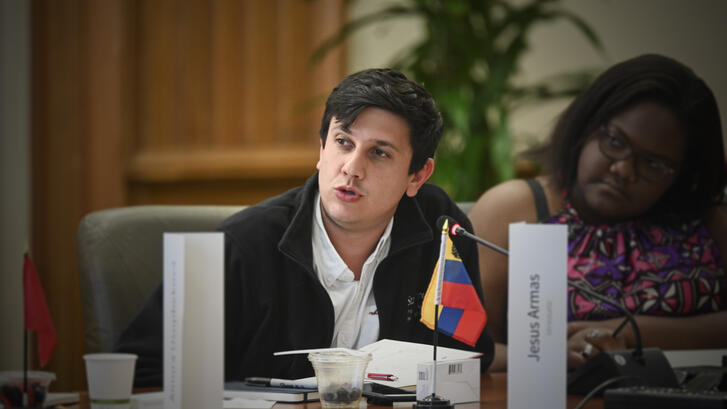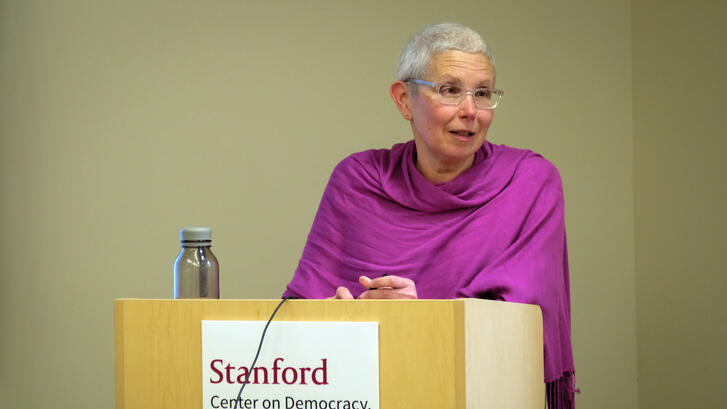Confronting Repression: Strategies for Supporting Political Prisoners
In the wake of Venezuela’s 2024 presidential election — marred by widespread fraud to ensure Nicolás Maduro’s re-election over opposition candidates Edmundo González and María Corina Machado — the regime has escalated its repression of political dissent. In the aftermath of the election, the regime arrested over 2,400 people. More than 807 political prisoners remain unjustly detained, including 95 women, 4 minors, and over 83 foreign nationals. These individuals, many held as leverage in international negotiations, are subjected to degrading conditions and denied due process.
Amongst them is Jesús Armas, a 2022 Fisher Family Summer Fellow at the Center on Democracy, Development and the Rule of Law (CDDRL) and a recently admitted student to Stanford’s Ford Dorsey Master’s in International Policy program (MIP). As a key campaign organizer for González and Machado, Jesús promoted civic participation and democratic unity in Caracas. He has now been held incommunicado, in conditions of physical and legal abuse, for over eight months. His arrest is emblematic of the Maduro regime’s broader strategy to silence opposition and dismantle civil society.
On August 4, 2025 Fisher Family Summer Fellows Lilian Tintori and Waleed Shawky joined Gulika Reddy, Director of the International Human Rights and Conflict Resolution Clinic at Stanford Law School (SLS), for a panel on how local and global communities can support political prisoners and their families. As Beatriz Magaloni, Graham H. Stuart Professor of International Relations, stated in her opening remarks: “This event should act as a call to action for deeper reflection and justice.”

Strategies for Release
Lilian Tintori, an internationally recognized human rights advocate and the wife of former political prisoner Leopoldo López (the 2022 Robert G. Wesson Lecturer in International Relations Theory and Practice at the Freeman Spogli Institute for International Studies), spoke candidly about her seven-year struggle to secure her husband’s release. “It is not easy,” she stated, “You become the voice of the political prisoner. You can’t talk, you have to scream in every crevice, every place, every moment you get.”
Tintori argues that the most important aspect for release is a community of resilience, which is to provide mental health and emotional support to political prisoners’ families, as they cannot act as the voice if they feel broken themselves. At the heart of this strength, she argued, is love. In her efforts, she now distributes the Pathway to Freedom handbook, produced through her organization, the World Liberty Congress, to help families navigate the grueling road to release.
“Torture only occurs because the Maduro regime knows we are the majority,” Tintori clarified. Since the beginning of 2025, five political prisoners in Venezuela have died in custody. Tintori emphasized the importance of protecting the life of the person being detained — the human being behind the titles of activist, mayor, or opposition leader, beyond a simple number. To raise awareness about political prisoners alike, Tintori often employs the strategy of always mentioning “other political prisoners” after their loved ones’ names. This keeps the broader community of victims in public consciousness.
With international and local channels to plead for help closing, such as the EU or historically, the U.S., all three panelists stressed that silence is not an option for all communities — including academic spheres — and the broader public. Tintori testified that after public pressure, the regimes do pay attention and often send proof of life to suppress further outrage, hence helping to protect prisoners until their release.
Ways to Support A Political Prisoner
Having been a political prisoner himself after co-founding the April 6th Youth Movement in Egypt, Waleed Shawky recounted what he believed carried him through his time behind bars — the cause he fought for. Upholding the values and vision that led to their arrest, he argued, can provide hope and dignity in the most inhumane conditions. “Being a victim is a choice as a prisoner, because you can choose to be a survivor,” Shawky asserted, “It is important to remind them of the bigger picture.”
Echoing Tintori’s previous statements, Shawky praised the courage of the families, particularly women, who visit and support prisoners, often at great personal risk. He also warned against idolizing or victimizing political prisoners. “They’re human,” he emphasized. “Don’t cry in front of them. Be strong; they need your strength.”
Authoritarian Crackdowns and Resistance
Gulika Reddy highlighted the challenges advocates operating in authoritarian contexts face and how they navigate these challenges. She broke it down into three different categories: movements, organizations, and individuals.
Movements are often delegitimized and co-opted. Reddy stressed the importance of engaging in grounded movement building, offering counter-narratives to sustain public trust, and fostering solidarity and collective action.
At the organizational level, regimes may block formal registration, restrict funding, and launch physical or digital attacks — including office raids and data seizures. To survive these assaults, organizations can diversify financial models, invest in digital security, and cultivate collective care to mitigate burnout and trauma. Additionally, there is a need to adopt diverse theories of change in contexts where traditional human rights tactics prove ineffective.
For individuals, threats include intimidation and retaliation, which can also extend to their loved ones. Reddy recommended conducting risk assessments and creating mitigation and response plans, including access to free legal aid and safe housing.
What we learned from our speakers is clear: authoritarianism thrives on silence, but freedom depends on our voices. For political prisoners around the world, solidarity, resilience, and an unwavering defense of human dignity are not just ideals; they are lifelines that can bring them home.
Read More

A panel discussion featuring 2025 Fisher Family Summer Fellows Lilian Tintori and Waleed Shawky, along with Gulika Reddy, Director of the International Human Rights and Conflict Resolution Clinic at Stanford Law School, explored the human cost of political imprisonment, the barriers advocates face, and the strategies available to combat them.






